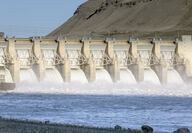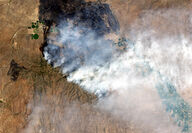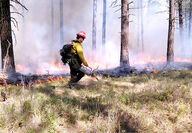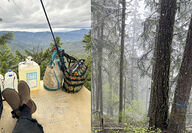Sorted by date Results 1 - 25 of 37

Oregonians born today are likely to experience a future of more drought, more rain and less snow under warming average global temperatures due to human-caused climate change. That’s one conclusion in the 314-page Seventh Oregon Climate Assessment, which was published Wednesday and authored by more than 65 scientists, experts and engineers, including from Oregon State University, the Oregon Department of Energy and the U.S. Department of Agriculture. Two engineers from Portland General Electric a...

After more than five years of waiting in some cases, wildfire survivors across the West will be relieved of paying federal income taxes on their recovery settlements and lawyers fees. The Federal Disaster Tax Relief Act passed the Senate on Wednesday night, about six months after it was approved by the U.S. House of Representatives nearly unanimously. It had been stalled for months, tucked into opposing tax packages from Senate Republicans and Democrats. The bill, which is likely to be signed...

Layers of volcanic rock in eastern Oregon, the Willamette Valley and the Columbia Basin have created fertile soil for farming and ranching, but in the future it could provide fruitful ground for a whole other industry designed to fight climate change. Oregon’s state geologist is pitching a novel idea of using the region’s rocky basalt layer—born of lava that flowed millions of years ago from cracks in the Earth’s crust—as a bank for storing planet-warming carbon dioxide. Ruarri Day-Stirr...

Oregon is one step closer to using a state forest to help capture and store more planet-warming greenhouse gases, and to fight climate change and earn money through the carbon market. Leaders at the Department of State Lands signed a development agreement Thursday to enter all of the nearly 83,000-acre Elliott State Forest near Coos Bay into the voluntary carbon market for 40 years. The project will be managed by the carbon brokerage and development company Anew Climate, with offices in...

Oregon school districts are projected to pay $670 million more to the state’s public employee pension program over the next two years, potentially wiping out all increases to school funding proposed by Gov. Tina Kotek. The increased tab, more than 10% for some districts, follows lagging returns in investments of the Public Employees Retirement system and could affect teaching and learning in some schools. “Next year’s sharp jumps in PERS rates will take significant money away from class...

When the Astoria City Council got the results of a forest inventory in the Bear Creek Watershed about a decade ago, councilors learned the city was in possession of far more valuable trees, and timber, than they had realized. In light of the news, some members of the council in northwest Oregon wanted to boost timber harvests and revenue for city services and infrastructure. The 3,700-acres of forests that protect the city’s main drinking water source have been logged semi-regularly for decades,...

The Oregon Department of Education (ODE) has released a guidance document for school districts, outlining research, recommendations, and three model policies to limit or restrict cell phone use in classrooms. The guidance aims to help school districts update their current policies on the use of cell phones and other mobile devices and increase student learning, well-being, and belonging. “We will be challenged to help students achieve their educational goals, like reading and math skills, if stu...

The extraordinary costs of climate change hit home for Cody Desautel during the 2015 wildfire season. Now the executive director of the Confederated Tribes of the Colville Indian Reservation, Desautel was a forester and a firefighter who had just completed taking a full inventory of the 922,000 acres of forest on the 1.4 million acre reservation in north-central Washington. About half of those forests – 450,000 acres – were nearly ready to be enrolled in California’s emissions trading progr...

A small statue of St. Francis sits on a stump holding court in Julie and John Christensen’s forest in Corbett. The patron saint of animals and ecology is at home among the couple’s 70-acres of Douglas firs, cedars and hemlocks near the Columbia River. The Christensens moved to Corbett, a small, unincorporated town 30 miles outside of Portland, in 1984, intending to make it a communal home for themselves and friends they’d met through Julie’s work as a Catholic campus minister at Western Washing...

No man-made machine on Earth can better capture planet-warming carbon dioxide from our atmosphere than a healthy forest. And the most effective carbon-storing forests in the world are the wet, dense, giant conifer forests of the Northwest. The forests in Oregon’s Coast Range absorb and store more carbon per acre than almost any other forests in the world – including the Amazon Rainforest. For more than a century, these forests have been heavily logged, supporting a vast timber industry wor...

Oregon was the first state in the U.S. to pass a law capping greenhouse gas emissions from power plants, and the first to create the prototype of a state-mandated carbon exchange. In 1997, the Oregon Legislature passed House Bill 3283, requiring all newly built energy facilities to keep their carbon dioxide emissions 17% below the cleanest power plant in the country. If unable to reach that target, the companies could pay to offset their emissions by investing in activities that would absorb...

Each year, the Oregon Department of Forestry responds to about 1,000 wildfires across the 16 million acres of land it protects. It investigates the cause of every fire, and if a person or group is found to have been negligent or malicious in starting or spreading a significant fire, the agency pursues reimbursement for its firefighting costs. The agency has not been very successful in recouping those costs, according to a report discussed at a March meeting of the four-member Emergency Fire...

Oregon’s forest and fire leaders were brief in describing this year’s wildfire season to a group of Oregon senators. “It just won’t quit is essentially where we’re at, and our folks are really tired,” Kyle Williams, deputy director of fire operations at the Oregon Department of Forestry, told the Senate Committee on Natural Resources and Wildfire on Tuesday. Williams and two others – Doug Graffe, Gov. Tina Kotek’s wildfire and military advisor, and Travis Medema, a chief deputy for the Oregon...

The Oregon Department of Forestry is getting help from the state's general fund to pay its bills after a record wildfire season. The Legislative Emergency Board voted Wednesday to send $47.5 million to the forestry department to help cover the costs of the 2024 wildfire season. Spending on wildfires this year has topped nearly $250 million, about 2.5 times the amount budgeted for the forestry department and the State Fire Marshal's Office for wildfire response. "The Department of Forestry has...

As Oregon heads into another hot weekend, Oregon House Republicans are calling on the state Legislature to reform forest management and logging policies they say would prevent large fires from starting and spreading. In a letter sent Wednesday, Republican Reps. Jeff Helfrich of Hood River, Ed Diehl of Stayton, and E. Werner Reschke of Klamath Falls said lawmakers should roll back regulations and conservation plans to allow more logging on state forests, limit liabilities for volunteer...

Persistent drought in the West over the last two decades has limited the amount of electricity that hydropower dams can generate, costing the industry and the region billions of dollars in revenue. The sector lost about 300 million megawatt hours of power generation between 2003 and 2020 due to drought and low water compared with the long-term average, researchers from the University of Alabama found. That equals about $28 billion in lost revenue. Half of the drop in power generation was due to...

More Oregonians are suffering from respiratory, heart and mental health issues caused by extreme weather events linked to climate change, and rural, elderly and minority communities are being hit the hardest, a new state report found. But new investments in portable air conditioners, home air filtration systems and gardens and green spaces are helping lessen the effects, according to the Oregon Health Authority’s latest Climate and Health in Oregon report. Analyzing 2023, officials found that m...

In just the last week, Gov. Tina Kotek declared five conflagrations – meaning many structures have burned or the scale of the fires exceeds local resources. They’re the result of some human-caused fires and thousands of lightning strikes earlier in the week that ignited more than 100 new fires. Ruiz-Temple and the Oregon Department of Forestry’s deputy director of fire operations, Kyle Williams, said lightning storms that are expected Friday through Monday will further elevate risk. Southcentral...

Inexplicable delays to a federal report on ending hydropower generation in the Willamette River Basin to save threatened fish are creating frustration and concern for tribal leaders and conservationists in Oregon. Congress directed the U.S. Army Corps of Engineers in 2022 to produce a report by the end of June 2024, detailing the impacts that eight federal hydroelectric dams in the Willamette River Basin have had on native fish populations over the past 60 years, and the possibility of deauthori...

A statewide “wildfire risk map” that drew the ire of many Oregonians will return in several weeks with few changes but with a new name following a yearlong makeover. The new “wildfire hazard map,” set to debut in mid-to-late July, will not differ in substance too much from the previous map published in 2022, according to lead researcher Chris Dunn, an Oregon State University forestry professor and wildfire expert. That first map was quickly taken offline in August 2022, just months after i...

Ecosystems in the Northwest were heavily shaped by wolves before they were nearly wiped out of the region, a new study finds. By the 1930s, gray wolves were nearly gone in Oregon and the rest of the West, leading to the multiplication of animals the wolves hunted and creating an imbalance in the environment, researchers at Oregon State University found. However, the full impact of their disappearance isn’t fully understood because ecological research from the last century largely left out the r...

Oregon is likely to face fewer big wildfires this summer than in previous years, but a lack of rural housing, coupled with unstable and often low pay, continues to create firefighter workforce challenges across the state and region. That was a big part of the message from state and federal fire and emergency response officials, who discussed this year’s fire outlook and what they need at a meeting Monday at the Northwest Interagency Coordination Center. The Portland-based center is part of a l...

The federal government this week acknowledged that the construction and operation of 11 hydroelectric dams on the Columbia and Snake rivers during the last century has had a devastating effect on eight Northwest tribes and more than a dozen native fish stocks, some of which have gone extinct. The acknowledgment came in a report, “Tribal Circumstances Analysis,” that was published Tuesday. It represents the first time that the U.S. government has comprehensively detailed the harm that fed...

Oregon’s state animal has for years been classified as a “predator” by the state fish and wildlife agency, and that’s meant that the North American Beaver has lived largely unprotected from private landowners who can kill them at will. That will change on July 1 when new rules go into effect under House Bill 3464, the “beaver bill.” The bill passed the state Legislature in 2023, and the Oregon Fish and Wildlife Commission, which crafts regulations for the Oregon Department of Fish and Wildlife,...

It was a mountain biker on a trail in Bend in 2022 who first spotted the pod of large old Ponderosa pines marked for cutting. The biker alerted local environmental groups, including the Bend office of the nonprofit Oregon Wild, where Erik Fernandez works as a wilderness program manager. Fernandez went out to photograph the trees in the Deschutes National Forest, some of which he and others figured were more than 80 years old after measuring their circumference. More than a dozen were marked...